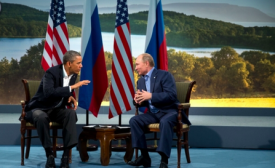russia
The Kremlin on Sunday accused Washington of trying to sabotage a U.S.-Russian agreement for Syrian leader Bashar Assad to surrender his chemical arsenal. “Our U.S. partners are beginning to blackmail us," Russian Foreign Minister Sergei Lavrov said Sunday in an interview with the First Channel, a state-owned television network.
Russia’s diplomatic intervention in the Syria crisis has received much praise from politicians and media outlets around the world. In a sense, the praise is deserved: by finally pushing the Assad regime into negotiations, Russia has halted – at least for the time being – a universally undesired military action.
Following an op-ed in "The New York Times" by Russian President Vladimir Putin, U.S. Senator John McCain promised to write a response for the Russian website Pravda.ru. It was published on September 19. McCain is a controversial figure in Russia for his combative stance against Putin. And Russian social-media users met his piece with applause, scorn, and ambivalence. Some notable reactions below.

Russia’s diplomatic intervention in the Syria crisis has received much praise from politicians and media outlets around the world. In a sense, the praise is deserved: by finally pushing the Assad regime into negotiations, Russia has halted – at least for the time being – a universally undesired military action.
The 2008 Republican presidential nominee, criticised Mr Putin and his associates for rigging elections, imprisoning and murdering opponents, fostering corruption and "destroying" Russia's reputation on the world stage.
As U.S. and Russian diplomats reached an agreement over the weekend to dismantle Syria’s chemical weapons stockpiles, the public expresses support for a diplomatic approach to the crisis but is skeptical about its effectiveness. By a 67% to 23% margin, the public approves of Barack Obama’s decision to delay military airstrikes and pursue a diplomatic effort to convince Syria to give up its chemical weapons. However, just 26% think Syria will give up control of its chemical weapons, while 57% think it will not.
In the former Soviet Union, when officials thought a citizen was stirring up trouble, they simply shipped him off to the Gulag. Today, authoritarian leaders have become more subtle about reining in those who would challenge the government – especially nongovernmental organizations promoting democracy and greater civil rights.
The United States doesn't have to trust Russian President Vladimir Putin, former Secretary of State Madeleine Albright said Sunday on "Face the Nation," over his tentative agreement to help identify Syria's chemical weapons, place them under international control and ultimately dismantle them was "the only way to solve" the country's raging civil war.







